14827 Hypnos
From Wikipedia, the free encyclopedia
| Discovery and designation | |
|---|---|
| Discovered by |
Carolyn S. Shoemaker Eugene Merle Shoemaker |
| Discovery date | May 5, 1986 |
| Designations | |
| MPC designation | 14827 Hypnos |
| Named after | Hypnos |
| Alternative names | 1986 JK |
| Minor planet category | Apollo asteroid |
| Orbital characteristics[1] | |
| Epoch October 27, 2007 | |
| Aphelion | 4.738 AU (Q) |
| Perihelion | 0.9536 AU (q) |
| Semi-major axis | 2.846 AU (a) |
| Eccentricity | 0.6648 |
| Orbital period | 4.80 a |
| Mean anomaly | 186.4° (M) |
| Inclination | 1.981° |
| Longitude of ascending node | 58.07° |
| Argument of perihelion | 238.0° |
| Physical characteristics | |
| Dimensions | 0.9[1] - 1.2[2] km |
| Geometric albedo | <0.067[1][3] |
| Absolute magnitude (H) | 18.3[1] |
|
| |
14827 Hypnos (also known by its provisional designation 1986 JK) is an Apollo near-Earth asteroid (NEA) discovered by Carolyn S. Shoemaker and Eugene Merle Shoemaker at Palomar Observatory on May 5, 1986. It is named after Hypnos, the Greek god of sleep.
Hypnos may be the nucleus of an extinct comet that is covered by a crust several centimeters thick that prevents any remaining volatiles from outgassing.[4] Hypnos is frequently perturbed by Jupiter.[5]
In 1958, Hypnos passed less than 0.03 AU from both Earth and Mars.[6] Neither planet has been approached so closely by Hypnos since the 862 pass of Earth, or will be until the 2214 pass of Earth.
It has a well determined orbit and has been observed 170 times since 1986.[1]

The eccentric (0.66) comet like orbit of Hypnos.
References
- ↑ 1.0 1.1 1.2 1.3 1.4 "JPL Small-Body Database Browser: 14827 Hypnos (1986 JK)". Retrieved 2008-02-08.
- ↑ "14827 Hypnos". The Near-Earth Asteroids Data Base at E.A.R.N. Retrieved 2008-02-08.
- ↑ "NEA RADAR ALBEDO RANKING". Asteroid Radar Research. 2007-05-04. Archived from the original on 4 February 2008. Retrieved 2008-02-08.
- ↑ Whitman, Kathryn; Alessandro Morbidelli and Robert Jedicke (2006). "The Size-Frequency Distribution of Dormant Jupiter Family Comets". Icarus 183: 101–114. arXiv:astro-ph/0603106. Bibcode:2006Icar..183..101W. doi:10.1016/j.icarus.2006.02.016.
- ↑ "JPL Close-Approach Data: 14827 Hypnos (1986 JK)". 2000-10-25 last obs. Retrieved 2009-05-06.
- ↑ "NEODys (14827) Hypnos". Department of Mathematics, University of Pisa, ITALY. Retrieved 2009-03-06.
External links
- Orbital simulation from JPL (Java) / Ephemeris
| |||||
| ||||||||||||||||||||||
This article is issued from Wikipedia. The text is available under the Creative Commons Attribution/Share Alike; additional terms may apply for the media files.